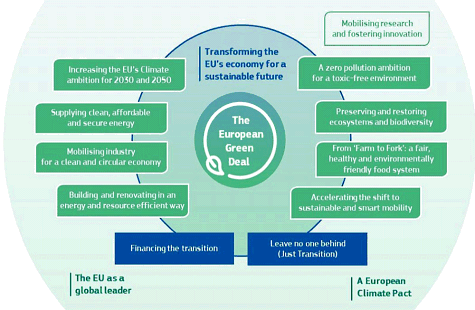European Green Deal
The European Commission communicated on the 11th December 2019, the European Green Deal (GD), a new growth strategy that aims to transform the EU into a fair and prosperous society, with a modern, resource-efficient and competitive economy where there are no net emissions of greenhouse gases in 2050 and where economic growth is decoupled from resource use. The Deal also aims to protect, conserve and enhance the EU's natural capital, and protect the health and well-being of citizens from environment-related risks and impacts.

The Green Deal consists of the following eight key policy initiatives:
i. Increasing the EU’s climate ambition for 2030 and 2050,
ii. Supplying clean, affordable and secure energy,
iii. Mobilising industry for a clean and circular economy,
iv. Building and renovating in an energy and resource efficient way,
v. Accelerating the shift to sustainable and smart mobility,
vi. From “Farm to Fork”: designing a fair, healthy and environmentally-friendly food system,
vii. Preserving and restoring ecosystems and biodiversity,
viii. A zero pollution ambition for a toxic-free environment.
The GD Roadmap represents the European Commission’s work programme for implementing the Green Deal, which includes an ambitious package of legal and other measures under each policy initiative, with a specific timeline for their adoption at EU level.
In Cyprus, with its decision on the 13th November 2020, the Council of Ministers (CoM) approved the new National Governance System for the European Green Deal in Cyprus, which is an evolution of the National System for Energy and Climate, as this was previously approved by the CoM (decision no. 83.709, dated 15/11/2017). It is noted to this end, that the implementation of the National Plan for Energy and Climate 2021-2030 is a key and integral part of the implementation of the European Green Deal in each member state.
As per the new structure, DG Growth in cooperation with the Department of Environment, of the Ministry of Agriculture, Rural Development and Environment, jointly act as the secretariat / coordinator of the new national system for GD in Cyprus. The new structure operates under the political guidance of a five-member Ministerial Committee and a corresponding Committee of Permanent Secretaries, while, at a technical level, the individual initiatives / themes of the GD will be examined by the competent Technical Committees.